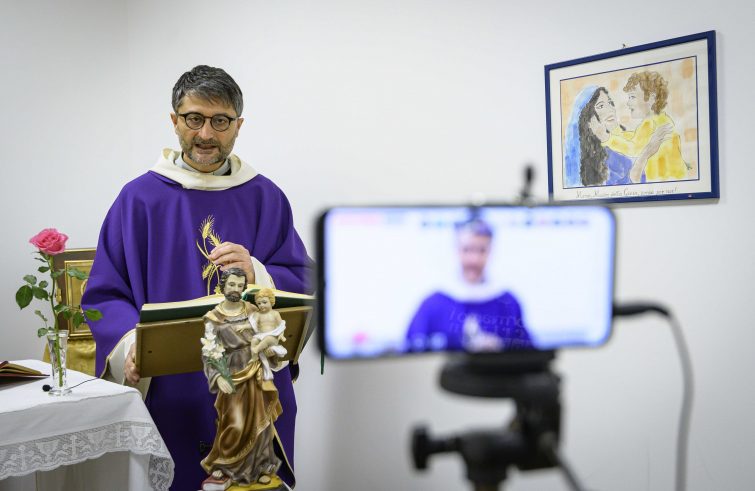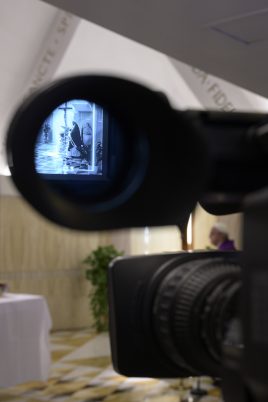
“One of the most important – albeit most disregarded – forms of contemporary communication is the art of listening. May the Church become a mentor of attentiveness and silence in a world where people just want to speak and make noise.” Don Fabio Pasqualetti, Dean of the Faculty of Communication Sciences (FSC) of the Salesian Pontifical University, reflects on the modes of communication adopted by the Church in this time of pandemic.
More than 3 billion people in the world are locked in their homes or subject to movement restrictions due to the pandemic. What does this distance mean for the Church?
The word that in my view encompasses everyone’s initial experience, including the Church’s, is “bewilderment”. In a short time we had to rethink everything we did and took for granted. The Church that is, or should be, the leading agent of encounter, of communion, of care for neighbour, source of humanness and community builder, was suddenly stripped of her fundamental feature, i.e. care for neighbour, notably understood as community. The fact of not being able to be together, for those whose activities have consistently been based on presence, has inevitably caused a sense of disorientation. This also happened with schools, in the family, involving all of our institutions and our society based on living together.
 Could this forced “distance” represent an opportunity to rethink community?
Could this forced “distance” represent an opportunity to rethink community?
When we know how to distance ourselves from what we are doing we gain greater perspective, we realize what is right and what is wrong. Distance, like the sudden absence of someone, highlights the meaningfulness of relationships. If you don’t miss what you did every day, it means that it wasn’t that important, and if you don’t miss someone who suddenly can’t be with you, it means that they weren’t fundamental to your life. We miss what gives meaning to our lives. So it can be said that this a time to understand if what we did was fruitful, vital and creative, or if it was routine, convenient and unable to sow the seeds of the future.
It cannot be denied that for some time already we have seen a gradual physical emptying of the churches.
I’ m not saying that Covid-19 struck the final blow, however it confronted us with the final stage of an ongoing exodus. This paradoxically forces us to examine the underlying reasons of this situation. Naturally one might argue that a large number of people are attending Holy Mass and prayers online. But the problem is more profound and these audiences could be yet another deceptive and transitory perception. The distance we are experiencing now could be a time to embrace the quest for meaning of present-day humanity, longing for a dialogue with the Church that is not based on dogmatic or moralistic teachings; calling upon the Church to resume her journey alongside the people, the poorest in particular. Believers are also in search of deep faith, disconnected from sacramental ritualism, of commitment in a community that lives out the values of the Gospel in a credible way within an increasingly economic and technologically-driven context.
Access to the Sacraments is currently prohibited in Italy to protect public health. But is the Eucharist simply “taking communion”?
The Eucharist is a sacrament that is celebrated to transform us into bread that is broken for others. The “fruit of the Eucharist is a Eucharistic life” of self-sacrifice for others. If this does not happen, it means that there is something wrong. Every day there are people who make themselves Eucharist for others by properly carrying out their job and putting themselves at the service of the common good. We are all admiring the heroic efforts of doctors, nurses, volunteers in various fields, law enforcement officers, and all those working in the most exacting environments. But to these whom we admire, we must also add parents who, locked in their homes, are putting themselves at the service of one another to make this time liveable for their children, creatively devising all sorts of new things. The same is being done by teachers and students, who from one day to the next were immersed in an online learning mode, working hard to do their best. These are but a few examples. So, if Christians cannot take communion, it doesn’t mean that they cannot live the Eucharist.
Sacramental communion must lead to social communion.
Entrepreneurs who are carefully planning all necessary precautions for a safe return to work for their employees, are generating a life of communion. So the Eucharist is not only about taking communion, it is about becoming communion, bread broken for others. The parable of the Good Samaritan, who holds in his heart the question “who is my neighbour”, is a deeply Eucharistic parable, for becoming neighbour is what God does with us every day also in Eucharistic form, inviting us to do the same with our brothers and sisters. Every day the Christian faithful incarnate their faith where they live and work, offering themselves at the service of others and becoming communion for others.

Many parishes, shrines, congregations and movements have increased their participation on social networks with livestreamed Masses, community prayers, personal accompaniment and many other initiatives. Is this a further step closer to the people?
I believe that in situations of prolonged suffering, such as the one we are living today, anything that can offer some comfort is welcome and beneficial. Having said this, however, it is also necessary to reflect on what is done, how and why. I we were to draw a comparison with the times of Jesus, it could be said that today social networks are the temples where people congregate, obviously the religion has changed, but a large number of people are there.
The Church has the sensitivity to be where the people are. But if we look at Jesus’ actions, although He attended the temple, He preferred the streets, the outcast outside the temple.
If social networks are the temple, the web is Sabbath, and it should be remembered that Jesus said, “The Sabbath was made for man, not man for the Sabbath” (Matthew 2:27). Even if the Church were able to run that temple and that Sabbath, she would need to remember Jesus’ words. I am not against the Internet, but it is naive to think that the corporations that run it do so for charity purposes. It’s equally naive to think that by entering their temples we are exempt from observing their rules. There is another interesting aspect: like all communication technologies, digital media reflect our image of society and of the Church. In my opinion, rather than a Church that renews herself, it is a Church that is bringing the pulpit online, replicating liturgical actions and devotions through digital windows, but barely acknowledging interaction, which is a specific feature of the web.
Dialogue is the core activity of the web
The distance referred to earlier should make us understand whether we are communicating in the right way or whether we need an exodus of liberation. Perhaps in this moment the Church should relinquish the certainties of the “onions of Egypt”, and should undertake a journey with the people in search of the promised land where the kingdom of heaven can be created with the poorest and outcasts. It is much easier to replicate what has always been done: online Masses, homilies, prayer and rosaries, rather than facing problems of social justice, care for the poorest, protection of the environment, of the young and of migrants. In short, to reflect on how to build a more sustainable world after the tragic experience of a pandemic.
There is, however, an opportunity to be seized…
At this time the Church can rethink herself, in order “step out” of established, consolidated patterns. Newness never arises from window dressing, or from polished technological devices: it arises from a newness of life. The current crisis is a crisis in meaning. Christian life is longing for people who know how to embody Jesus’ word in the present times, who know how to engage in dialogue with neighbour, with science and technology and with the problems they raise to contemporary humanity. We can ask ourselves a simple question: what is the difference between a person who says he lives by faith in God and one who lives without faith today? The answer cannot be theoretical, it must be concrete, made of gestures and deeds, for the Word is either incarnate, or it is not the Word of God.

Is there a lesson to be learned also in terms of communication?
The Church should cherish the memory of when Jesus girded Himself and washed His disciples’ feet. This extraordinary communication expresses the fact that the Christian life embodies a service and not a power.
We need communication at the service of humankind.
Obviously the Church cannot be naive, she must understand and acknowledge communication reality and technology, and their proper use, but she must also remember that at every sign of the crowd acclaiming Him, Jesus takes refuge in solitude and prays. Social media are places of enticement and easy consensus, created with effortless “likes” by online audiences which deeply deceive their recipients.
Pope Francis’ most influential word these past weeks was his prolonged silence in a silent and deserted St Peter’s Square during the Way of the Cross. The Church must not be afraid of not having all the answers, she must be afraid of having too many certainties.
We don’t use communication to manipulate and subjugate, but to liberate. The exercise of freedom is first and foremost an exercise of responsibility. The word of Jesus is radically inconvenient. Had it not been so, He would not have been condemned and put to death on the cross. Giving it topical relevance means questioning the new religions, the new temples and the new Sabbaths aimed at subjugating the human person.










